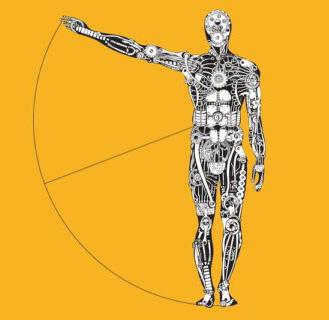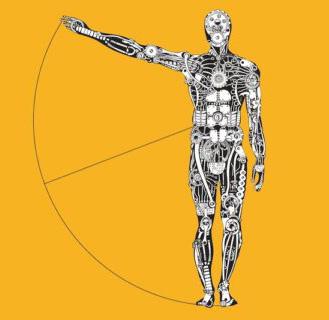
5 minute read
Advancing Global AI and Human Rights Framework Stellenbosch Dialogue
text: Dr Dirk Brand
photo: Gerd Leonhard/Flickr
The Policy Innovation Lab, through the School for Data Science and Computational Thinking at Stellenbosch University recently participated in a high-level dialogue on Artificial Intelligence (AI) and human rights. The event brought together leading voices from academia and government. Chair of Policy Innovation Lab, Prof Willem Fourie facilitated a panel and was a participant on a panel about centering perspectives from the global south. The Lab’s digital transformation researcher, Dr Gray Manicom, facilitated a panel on sectoral impacts of AI on human rights.
This regional dialogue was held in collaboration with the Institute for Ethics in Artificial Intelligence (IEAI) at the Technical University of Munich. The event built on ongoing international efforts, particularly the Munich Summit on AI and Human Rights, to promote inclusive, rights-based approaches to AI governance. A key outcome of the Munich Summit has been the Munich Convention on AI, Data and Human Rights, a concrete proposal for a UN Convention on AI and Human Rights. This initiative aims to catalyse global discussions toward a binding human rights-based framework for AI.
A continuation of pioneering work
Scholars from institutions including TUM, LMU, and Stellenbosch University have been instrumental in advancing the Munich Convention draft, which outlines concrete steps toward a binding international treaty on AI, data, and human rights. Building on the foundational work of the Munich AI and Human Rights Summit, the Convention reflects a multi-stakeholder, transdisciplinary effort to move beyond fragmented soft law approaches and establish an enforceable global standard for AI based on the UN Charter and the Universal Declaration of Human Rights. The recent dialogue in Stellenbosch deepened this process by incorporating critical regional insights and Global South perspectives, addressing the need for global stakeholder representation in global AI governance.
As a response to growing concerns over increasingly fragmented national regulations, the proliferation of voluntary ethical guidelines, and the lack of enforceable safeguards against AI-related human rights harms, the Munich Convention represents a systematic and necessary progression toward global AI governance rooted in international human rights law. Its official presentation to the UN Human Rights Council in Geneva in March 2025 marked a pivotal moment in this process, positioning the Convention as the next logical step for the international community to close governance gaps, harmonize standards, and address the structural risks posed by AI to dignity, equality, and democratic accountability, while ensuring adaptability of regional or in-country context.
The central agenda item was the role of the “Global Majority”, inclusive of nations from the Global South, in shaping international frameworks that govern the development and deployment of AI technologies, ensuring inclusive and equitable governance. The event was explicitly held in South Africa, as the country has emerged as a significant regional power and has contributed significantly to international debates on decolonization and transitional justice post-Apartheid.
A call for a global framework on AI and human rights
There was broad consensus on the urgent need for a binding global framework on AI and human rights, grounded in the principles of the UN Charter and the Universal Declaration of Human Rights. Such a framework is seen as essential for preventing the deepening of digital inequalities and ensuring that AI technologies serve global public goods rather than entrenching structural disparities and digital divides, which could be reinforced by AI and other digital frontier technologies such as quantum computing.
Participants emphasised the importance of engaging with African Union initiatives and other regional governance structures to ensure meaningful participation of Global South actors in global normsetting processes. This is especially vital for ensuring a holistic understanding of the human rights impacts of AI, including socio-economic, cultural, and political dimensions, within the broader international legal framework.
Toward interoperable ethical standards based on international human rights law
The discussion highlighted the pressing need to ensure interoperability among national and regional ethical frameworks, with particular attention to the emerging African AI Convention. Harmonizing such standards is viewed as a foundational step toward a coherent global AI architecture that respects cultural pluralism while reinforcing universal rights. This complements the G20’s approach to promote inclusive digital infrastructure and emerging technologies, including AI.
Participants highlighted several urgent priority areas, including the use of AI in healthcare and education, the development of robust impact assessment frameworks, and the standardization of governance tools to ensure accountability, transparency, and the protection of fundamental rights in practice. Additionally, greater efforts are needed to align AI systems deployed in societal contexts, such as large language models, with specific cultural sensitivities, model assumptions aligned with the developmental conditions in the Global South and inclusive linguistic representation. Major issues discussed included the articulation of digital rights within a binding UN Convention on AI, the recognition of data and human rights (including the right to explainability), the integration of collective rights, the preservation of linguistic diversity, and the promotion of digital literacy. Participants also underscored the urgent need to address global disparities and to establish strong institutional safeguards to ensure that AI development is not only technologically advanced but also equitable, inclusive, and rights-based.

Resources
Whitepaper “Promoting and Advancing Human Rights in Global AI Ecosystems: The Need for a Comprehensive Framework under International Law”
Draft of the Munich Convention on AI, Data and Human Rights










